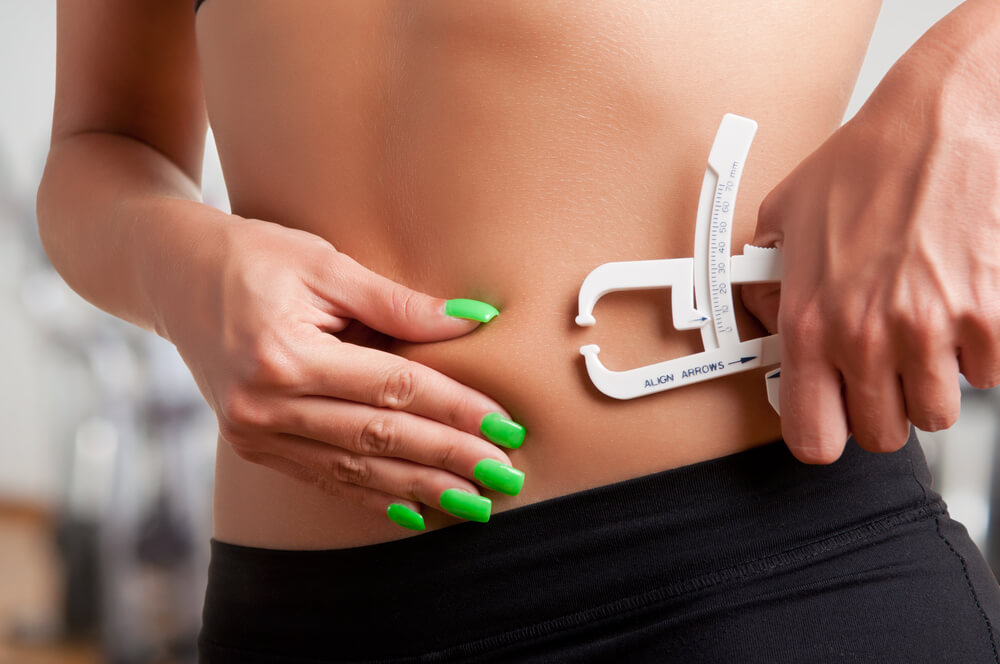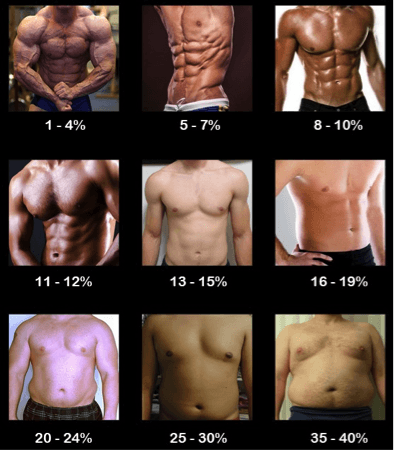
Do you know to accurately measure your body fat percentage?
In its simplest form: body fat is the amount of fat in your body, compared to everything else. Everything else includes your organs, muscles, bones, tendons, water, and so on.
In this article, I am going to straighten it all out, so you know how to accurately measure, and estimate, body fat percentages, and how to use this newfound power to help you build a better body and track your progress more accurately.
Despite what you might think of it, body fat isn’t just unsightly extra flesh.
Body fat protects vital organs from damage, and it helps maintain body temperature. It also is vital for the production of certain hormones and other chemicals related to fertility, immunity, appetite, bone strength, and more. The key then, is to achieve the optimal amount of body fat to look the way you want to, and maintain your internal health.
Body Fat: Why Is Too Much Bad?
Although the body cannot function smoothly without body fat, it is also important to remember that too much of body fat can negatively affect the body.
Very often, the fats absorbed during meals don’t burn off but are stored in the body. This accumulation of body fats may lead to obesity that can then set off many other known health issues like breathing difficulties, diabetes, arthritis and heart disease.
To prevent problems associated with too much body fat, we must be aware of our current body fat percentage so that we can have a clear picture of where we are going towards the ideal percentage for our goals and bodies. Also when you learn to lose a ton of body fat you will want to look at how to get rid of excess skin after weight loss.
According to the American Council on Exercise, body fat must ideally constitute 14 – 17% of the total weight of a man. For women, body fat should be around 21 – 24% of total weight.
If you gain or lose only fat, your body fat percentage goes up or down accordingly. But it can also go up without gaining fat, and down without losing fat. Confused? Don’t worry, we’ll break it down.
If you weigh 200 pounds, and 20 pounds of that is fat, then your body fat percentage is 10%. 30 pounds of fat would put it at 15%, 40 pounds at 20%, and so forth.
Ideal Body Fat Percentages for Men and Women
While some people may want to look like a shredded bodybuilder (3 – 4% body fat for men, when on stage, 8 – 9% body fat for women) year round, it’s physically impossible simply because the body needs a certain amount of body fat for health reasons. This is especially true if you are trying to increase your muscle mass. It’s nearly impossible to grow muscle without
For women between age 20 and 40, 19% to 26% body fat is generally good to excellent. For women age 40+ to 60+, 23% to 30% is considered good to excellent.
For men between age 20 and 40, 10% to 20% body fat is generally good to excellent. For men age 40+ to 60+, 19% to 23% is considered good to excellent.
What’s a good amount of body fat to have?
Here is the generally accepted chart for body fat in women and men:
| Women | Men | |
| Essential fat | 10-12% | 2-4% |
| Athletes | 14-20% | 6-13% |
| Fitness | 21-24% | 14-17% |
| Acceptable | 25-31% | 18-25% |
| Obese | 32% plus | 26% plus |
| What Is Your Body Fat Goal? |
- If you are looking to have that “ripped ” look you’ll want your body fat percentage to hover in the “athletes” section.
- If you’re looking to look healthy, you’ll want to be in the fitness range.
- If you are interested in getting that coveted six pack,drop your body fat down to the 8-11% range for dudes and 15-17% range for women.
- If you are trying to look like Ryan Reynolds or Jessica Beil, good luck!Aim for a body fat percentage of 6-8% (men) or 13-15% (women).
- If you are interested in getting that coveted six pack,drop your body fat down to the 8-11% range for dudes and 15-17% range for women.
What do these amounts look like?
Below, you’ll see body fat pictures of people with different amounts of body fat.
10% body fat on a guy with no muscle will look very different than 10% on a guy with a lot of muscle, simply because the extra muscle fills out the physique and gives definition.
The Following images are accurate representations of various body fat percentages given the amount of muscle the guys have.
If you have less muscle than any of the guys portrayed above, you can still use this chart for reference by paying particular attention to the torso.

- All abs become visible around 10%, and ab vascularity usually starts showing around 8%.
- As you get leaner, the serratus becomes more pronounced, and around 5-6%, you can no longer pinch fat anywhere on your body but maybe a little in the oblique area, and your body begins to look “grainy.”
As you’ll see, women look much leaner than men at higher body fat percentages.
Most of these visuals are pretty accurate for the average woman, with the exception of the leanest categories (most women won’t have this much abs definition unless they’re veteran weightlifters).
*Abs begins to show clearly around 17-18%, and torso vascularity around 13-14%.
Compare what you see to the pictures above for an estimate of measuring body fat percentage. Simple, it but requires a bit of a trained eye to be accurate. You can easily get an idea of your approximate body fat percentage by eyeballing.
What’s a realistic amount of body fat to aim for?
Body fat is an incredibly tricky subject – it’s tough to calculate, tough to track, and most people are way off in their estimates of what they think their body fat percentage is.
In order to ascertain your real body fat percentage, you might need something to help figure it out. If you want a generally idea of what your body fat percentage is, an online calculator can be helpful. By providing the body fat calculator with information about age, weight, gender, the body fat calculator can provide general information on body fat percentage.
What is my body fat percentage?
The question I get asked above ALL others.
A quick Google search will reveal dozens of methods to measure body composition ranging from the quick and (relatively) painless to the incredibly detailed. These measurement techniques can help individuals set baseline values for body composition and goals for later on down the line. However, with the variation in methods comes a fluctuation in accuracy.
Well, there are several ways to do it:
-
Body Fat Calipers
Pick up a set of calipers for $5.
Pull the fat away from your muscles, pinch them with the caliper, take the measurements, and look at a chart to figure out your body fat percentage. Some recommend using one test site, some multiple but are surprisingly accurate considering how cheap they are.
-
Body Measurements
The most common methods are the US Navy and YMCA methods, and neither are consistently accurate (you can easily read too high). I have found, as others have, that this method isn’t incredibly accurate as it can very easily overestimate your body fat. Considering it only takes a few points of data into consideration, this is not overly surprising.
-
Body Fat Scales & Monitors
An electrical current is sent through your body and uses “biometrical impedance analysis.” I don’t really like this method, as I find the number that it spits out to be horribly inaccurate; because they send an electrical current through your body, the amount of water you are carrying can drastically adjust this number.
-
The Bod Pod
The method calculates your body fat percentage by using air displacement to measure your body mass, volume, and density. This is also pretty darn accurate, but also pretty darn expensive at usually around $75 per session.
-
Dexa Scanning
Dual-energy X-ray absorptiometry (DEXA) This is considered the most accurate method, as it actually takes a full dual X-ray of your body composition and gives you numbers. You can get this done at a health facility, and involves you lying on an X-Ray table for about 10 minutes. It’s typically expensive, anywhere from $50-150 per session depending on where you are located.
VERY IMPORTANT: If you are going to start testing your body fat percentage, do whatever you can to test yourself under the same conditions each and every time.
For example: every Monday morning, on an empty stomach, while drinking a single glass of water. This way, even if you’re not getting the correct body fat percentage , you’ll at least get a consistent incorrect body fat percentage and can calculate how much you lost or if you are progressing in the right way. Remember that metrics like body fat are really best used as a relative measure of your own progress.
PS : If you have the money, and you have a Bod Pod center close to you, then I’d say this would be the best combination of practicality and accuracy. If you don’t have the money, then I would go with a simple body fat caliper, along with the “take a look” method.
Look in the mirror: do you like how you look? Awesome. Do you NOT like what you see? Follow the advice in the next section and we’ll work on improving those stats.

How to Reduce Body Fat Percentage
Here are the best methods that I’ve found to get down to very low body fat percentages.
Note: these are JUST suggestions, your results may vary!
If you only want to drop a few percentage points, you can start with the advice at the top, and work your way down towards the bottom as you get lower and lower – the closer you get to single digits (dudes) or low double digits (ladies), the more strict you need to be with your diet and training.
Create a caloric deficit – Although I believe there is more to it than just this, in order to lose weight, you need to be eating to create a caloric deficit – this means burning more calories than you consume. If you are not strength training and still consuming lots of carbohydrates, you will most likely be losing muscle along with fat, which is not optimal but will help you lose body fat.
Lift heavy things – When you strength train with heavy objects (or with intense body weight training), you get stronger and keep the muscle mass that you already have. On top of that, you also push your metabolism into an “afterburn effect” which burns extra calories for hours even after you are done working out.
Sprints – When you run sprints, you create a similar afterburner effect as with strength training, meaning extra calories burned after the completion of your workout.
Eat less than 100 grams of carbohydrates per day – When you deprive your body of carbohydrates, it no longer has steady access to its preferred source of energy, sugar (which all carbs become once they’re consumed and processed by your body). It now has to pull from fat storage to fuel itself.
Work out in a fasted state – Although advanced techniques to get down to super low body fat percentages are beyond the scope of this article, here’s another tactic if you want to drop the last few percentage points: strength train in a fasted state, and don’t consume your first meal of the day until AFTER your workout. This is a technique used by LeanGains and guys like Vic Magary and Anthony Mychal.
Conclusion
Now you have a few ways to get an accurate measure of your body fat percentage. On your road to lowering those numbers, iIt is best to adopt a plan that combines a good exercise regimen with a healthy diet of fresh fruits, vegetables, whole grains and a minimum amount of processed carbohydrates. You should seek to keep body fat levels to the ideal percentage you saw in our chart to optimize your health and physique.
-Terry Asher
What did you think of this article on how to measure your body fat percentage? Have anything else you’d like to share? Let me know in the comments below!
Terry
Latest posts by Terry (see all)
- How Important Are Net Carbs For Building Huge Muscle? - Apr 28, 2017
- The Matt Damon Workout Explained - Apr 27, 2017
- Watercress – Benefits And The Best Way To Consume It - Apr 26, 2017












Good post on body fat… Thank you very much Gymjunkies!
Chang,
Thanks for stopping by!
Terry